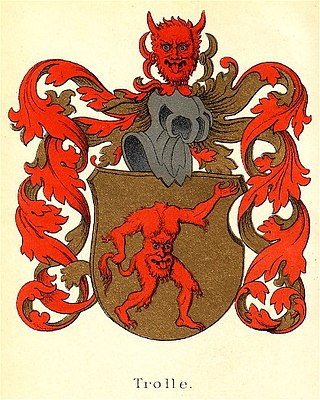Eric Trolle may refer to:
- Erik Trolle (c. 1460–1530), regent of Sweden
- Eric Trolle (diplomat) (1863–1934), Swedish diplomat
Eric Trolle may refer to:

The Stockholm Bloodbath was a trial that led to a series of executions in Stockholm between 7 and 9 November 1520. The event is also known as the Stockholm massacre.

Sten Sture the Younger, was a Swedish nobleman who served as the regent of Sweden, during the era of the Kalmar Union.
Erik Trolle was elected regent of Sweden in 1512, during the era of Kalmar Union. He was Justiciar of Närke and a Lord High Councillor of Sweden from 1487.

Christina Nilsdotter Gyllenstierna of Fogelvik was a Swedish noblewoman. She was married to the Swedish regent Sten Sture the Younger, and led the Swedish resistance against Christian II of Denmark after the death of her spouse. In her own lifetime she was simply referred to as Fru Kristina, but she has become known in history as Kristina Gyllenstierna because of the house of nobility to which she belonged.

Johannes Magnus was the last functioning Catholic Archbishop in Sweden, and also a theologian, genealogist, and historian.

Gustav Eriksson Trolle was Archbishop of Uppsala, Sweden, in two sessions, during the turbulent Reformation events.

Herluf Trolle was a Danish naval hero, Admiral of the Fleet and co-founder of Herlufsholm School, a private boarding school at Næstved on the island of Zealand in Denmark.

The given name Eric, Erich, Erikk, Erik, Erick, Eirik, or Eiríkur is derived from the Old Norse name Eiríkr.
Arvid Birgersson, Lord of Bergkvara was a Swedish magnate and politician in the last decades of Middle Ages. He was justiciar of Östergötland and then of Tiohärad, as well as a Lord High Councillor of Sweden, and once a candidate for Regent. His family coat of arms depict a headless troll whereby some have retrospectively called him Arvid Trolle.

The House of Trolle is the name of a noble family, originally from Sweden. The family has produced prominent people in the histories of Sweden and Denmark since the Middle Ages and is associated with several estates in both countries.
Arvid, Arved, Arnvid or Arvydas is a male given name, most common in Scandinavia but also in Iran and Lithuania. In Scandinavia it is derived from Old Norse Arnviðr and means "forest of eagles" or 'eagle wood'. Arvid is a royal male name that is composed of words with the meanings "king" and "legend". In Old Persian, Arvid is derived from 𐎠𐎼𐎡𐎹 + veid meaning "Aryan knowledge".

The Reformation in Sweden is generally regarded as having begun in 1527 during the reign of King Gustav I of Sweden, but the process was slow and was not definitively decided until the Uppsala Synod of 1593, in the wake of an attempted Counter-Reformation during the reign of John III (1568–1592).
Events from the 1560s in Denmark.
Arvidsson is a Swedish surname. Notable people with the surname include:

Events from the year 1520 in Sweden.
Events from the year 1530 in Sweden
Rolf Andersen may refer to:

The Wachtmeister family is a Swedish noble family from Livonia, who immigrated to Sweden in the 16th century. The name Wachtmeister is German for 'sergeant'.

Eric Trolle (1863–1934) was a Swedish diplomat who held several posts, including minister of foreign affairs and governor of Östergötland County.
Trolle is a surname which is common in the Scandinavian countries. People with the surname include: